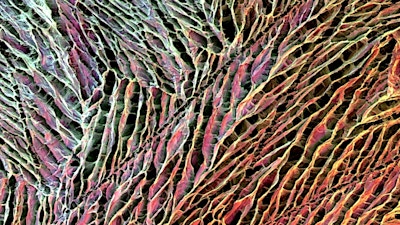A minimally invasive method for delivering drugs and cell therapies to specific organ sites
Wyss researchers have developed a new approach to delivering drugs and therapeutic cells using biocompatible and biodegradable hydrogels made of alginate, a naturally occurring polysaccharide from brown algae. Injectable hydrogels could greatly improve clinical ability to provide extended drug release and controlled delivery throughout the body or at targeted local sites. The method holds promising implications for improved cancer treatment and other therapies requiring drugs to be delivered at the right place and the right time — from post-surgery pain medications to protein-based drugs that require daily injections.

1/2 In this image, new bone structure has formed after stem cells were transplanted using the novel hydrogel strategy developed at the Wyss Institute and described in the September 14 issue of Nature Materials. Credit: Wyss Institute at Harvard University 
2/2 This scanning electron microscopy image shows the thawed cryogel with its well-organized interconnected porous architecture ready to be infused with cancer cells and immune factors. Credits: Ellen Roche, James Weaver, Sidi A. Bencherif / Wyss Institute at Harvard University
Today, to deliver drugs or protein-based therapeutics, doctors often give patients pills or inject the drug into their bloodstream. Both methods deliver the drug throughout the body, sometimes failing to deliver effective doses to the specific tissue the doctor wants to target. In some cases, the drug or protein is broken down or excreted too quickly to exert its effects. In others, large doses must be injected to deliver enough drug to the target tissues, causing harmful side effects. In contrast, the injectable alginate hydrogels being developed at the Wyss Institute can deliver cells as well as drugs. In addition, hydrogel treatment can be used alone or together with conventional therapies.
Our approach offers a double whammy – we have shown that we can use the hydrogels repeatedly and turn the drug pulses on and off at will.
The injectable hydrogels can be delivered in a minimally invasive manner due to their extreme flexibility and resilience, enabling them to be compressed to a fraction of their size and injected underneath the skin via a surgical needle. Once injected, they quickly bounce back to their original dimensions to do their job.
This technology is available for licensing.
